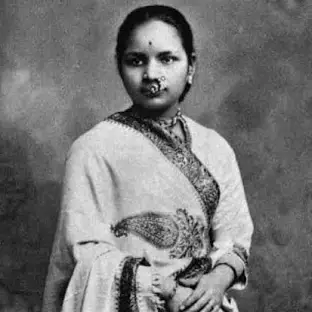
Dr. Anandibai
Dr. Anandibai Joshi, born Yamuna on March 31, 1865, in Kalyan, Maharashtra, India, stands as a beacon of perseverance and dedication in the realm of medical science. Despite the societal constraints and limitations imposed on women during the 19th century in India, Anandibai’s relentless pursuit of knowledge and her unwavering commitment to her goals have etched her name in history, albeit not as prominently as it deserves.
Anandibai’s childhood was steeped in traditional Indian values and customs. Her family, though well-meaning, adhered to the conventional norms that restricted educational opportunities for girls. However, Anandibai’s intellectual curiosity could not be stifled. She harbored dreams of making a difference in the world, a vision that would eventually lead her to break numerous barriers.
The Journey to Education
Married at the tender age of nine to Gopalrao Joshi, a progressive thinker, Anandibai’s life took a significant turn. Gopalrao, who recognized her intellectual potential, encouraged her to pursue education—a radical idea at the time. Tragedy struck when Anandibai lost her infant son to a lack of medical care, a heartbreaking incident that fueled her determination to study medicine and alleviate the suffering of others.
Gopalrao’s support was instrumental in Anandibai’s journey. He was a postal clerk by profession but possessed a progressive mindset that was rare in those days. He not only encouraged Anandibai to learn English but also supported her decision to study abroad, recognizing that advanced medical training was not available in India at the time.
Overcoming Adversity
In 1883, at the age of 18, Anandibai embarked on a journey to the United States to study medicine at the Woman’s Medical College of Pennsylvania. This was a monumental step, as it not only defied societal norms but also involved immense personal sacrifice and resilience. Despite facing racial and gender-based discrimination, Anandibai excelled in her studies, driven by her mission to serve her community.
Her journey was fraught with challenges. Traveling to a foreign land, battling the harsh climate, and adjusting to a different culture were just a few of the obstacles she faced. Additionally, she had to contend with the skepticism and prejudices of both the American society and her fellow Indian expatriates. Yet, Anandibai’s determination remained unshaken.
Achievements and Legacy
Anandibai Joshi graduated with an MD in 1886, becoming one of the first Indian women to obtain a medical degree in the Western world. Her thesis on “Obstetrics among the Aryan Hindoos” was a pioneering work that highlighted the medical practices and challenges faced by Indian women. Upon her return to India, she was appointed as the physician-in-charge of the female ward at the Albert Edward Hospital in Kolhapur.
Her return to India was met with both admiration and skepticism. While she was hailed as a pioneer by many, others viewed her with suspicion and doubt. However, Anandibai remained focused on her goal of improving medical care for women in India. Her work at the Albert Edward Hospital was groundbreaking, as she introduced modern medical practices and emphasized the importance of hygiene and proper prenatal care.
Impact and Recognition
Although Dr. Anandibai Joshi’s career was cut short by her untimely death at the age of 21 due to tuberculosis, her legacy endures. She broke barriers and paved the way for future generations of women in medicine. Her life story, marked by courage, determination, and an unyielding spirit, serves as an inspiration to countless individuals striving to make a difference.
In recognition of her contributions, several institutions and awards have been named in her honor. Her story is often included in school curricula, and her life has been the subject of numerous biographies and documentaries. Despite her brief career, the impact of her work continues to resonate in the fields of medicine and women’s rights.
Reflections on Her Legacy
Dr. Anandibai Joshi may not be a household name, but her contributions to medicine and her role as a trailblazer for women’s education and empowerment cannot be overstated. She is a true unsung hero whose story deserves to be told and celebrated, reminding us of the profound impact one individual can have on society.
Her legacy is a testament to the power of education and the importance of breaking societal barriers. Anandibai’s story encourages us to challenge the status quo and strive for progress, regardless of the obstacles we may face. Her life serves as a reminder that with determination and support, even the most formidable challenges can be overcome.
Conclusion
Dr. Anandibai Joshi’s journey from a small town in India to becoming one of the first Indian women doctors is a remarkable tale of resilience and courage. Her contributions to medicine and her pioneering efforts in women’s education have left an indelible mark on history. As we celebrate her legacy, let us be inspired by her example and continue to champion the cause of education and empowerment for all.
By: Lavy Kumari
Write and Win: Participate in Creative writing Contest & International Essay Contest and win fabulous prizes.


